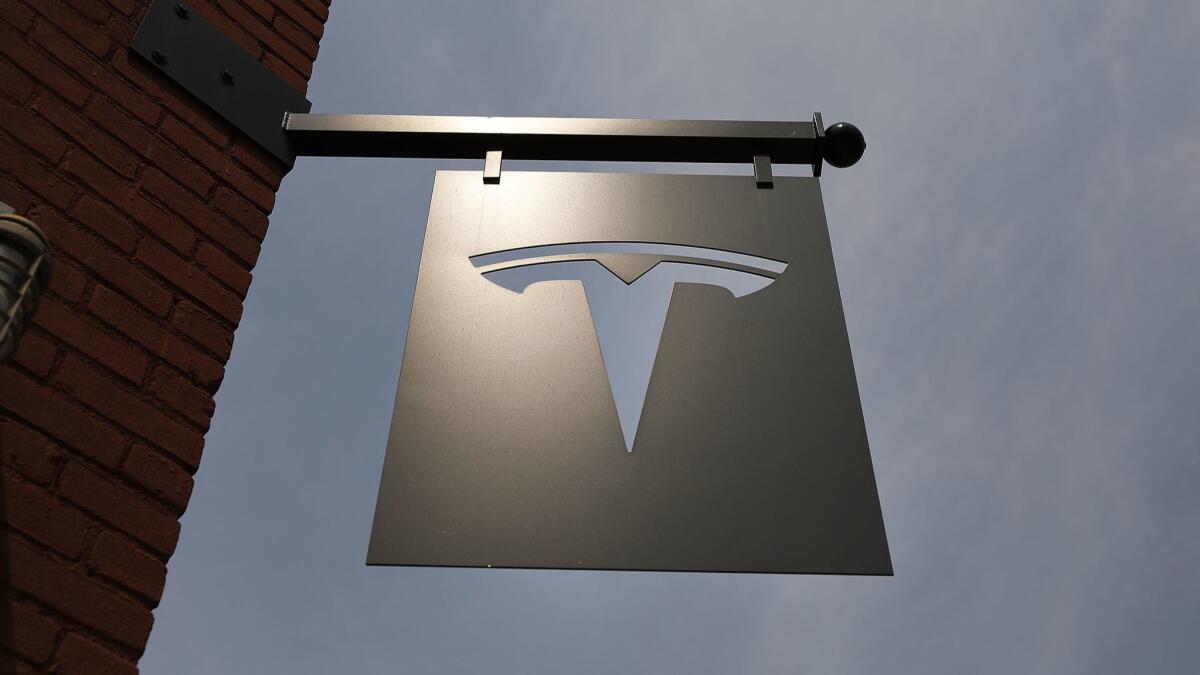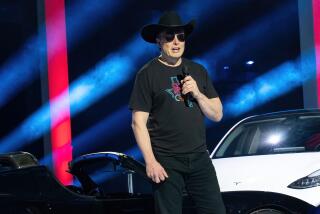Tesla’s board backs Musk after fraud charges. But what’s the company worth if he’s forced out?

- Share via
A day after regulators leveled fraud charges against Elon Musk, the Tesla chief executive and his board appeared to dig in for a fight. And investors were forced to contemplate a future for the carmaker without its driving force.
Musk has hired Chris Clark, a former U.S. attorney who successfully defended Dallas Mavericks owner and “Shark Tank” star Mark Cuban against insider trading charges filed by the Securities and Exchange Commission. A pretrial hearing has been set for Feb. 1 at the U.S. District Court in New York City.
The Tesla board of directors apparently is not contemplating replacing Musk anytime soon. The company and the board released a supportive statement Thursday.
Whether the board would reevaluate should Department of Justice criminal charges be filed, or the SEC files further charges, is unknown. The SEC charges come atop a pile of investor lawsuits filed against Tesla.
The SEC filed fraud charges against Musk on Thursday over a series of tweets on Aug. 7 that claimed he had “funding secured” for a deal to take the company private at $420 a share. There was no funding secured, and the subsequent rise and fall of Tesla stock defrauded investors, the SEC charged.
The SEC is asking the court to ban Musk from serving as an officer or director at any publicly traded company, although he can remain at Tesla while the case is pending.
Meantime, Musk and the board must grapple with the fact that the cash-bleeding company must pay back $1.15 billion in debt over the next six months and figure out how to raise new money under fraud charges and a criminal investigation.
“I just don’t see how on earth this company raises money,” said David Whiston, stock analyst at Morningstar.
The SEC move effectively nixes a new public debt offering. Large private investors have yet to come forward. The company’s current bonds are at junk levels, with one major issue yielding 8.27% in a low-interest-rate environment.
“If you’re thinking about buying new Tesla debt, how do you take that to your credit committee with all these clouds out there?” said Rob Majteles, who runs Treehouse Capital, an investment firm whose short position on Tesla is a bet that the company’s stock will eventually plunge. “Instead, you could say, ‘Hey, let’s buy debt that’s already out there at [a big discount] and have a seat at the table’” in bankruptcy court if Tesla goes south.
Lloyd Greif, chief executive of Los Angeles investment banking firm Greif & Co., predicted a takeover by a major auto company or buyout firm at a price far below the company’s current trading range. Tesla’s stock closed down nearly 14% Friday, at $264.77.
Tesla’s shares are now down 30% from their tweet-driven, year-to-date high of $379.57 on Aug. 7.
“There is only one way this ends up, Tesla gets taken over,” Greif said. “And the closer they get to refinancing the debt, the more they’ll have a gun to their heads, and have to sell at a fire-sale price.”
What would a buyer get? “The strength of the brand, the strength of the user base, the pipeline of new owners,” he said.
Tesla has not lost its true believers. Galileo Russell, the YouTube star who Musk invited to ask questions in an earnings call earlier this year, tweeted on Thursday: “I’ll go down with the ship before i give up. the fight for a sustainable future is much bigger than a tweet. i stand behind @elonmusk & @Tesla all the way. proud to be a shareholder of the company that singlehandedly is getting the planet off fossil fuels.”
Production and sales of Tesla’s Model 3 are up, albeit at levels far below Musk’s ambitious forecasts. Even after Friday’s drop, the company still carries a market value of $45.1 billion, higher than Ford Motor Co. and just short of General Motors’ $47.5 billion.
“The Model 3 is amazing, the owners love it, the product is the biggest game changer over the next decade,” said Ross Gerber, chief executive at the Gerber Kawasaki investment management firm in Santa Monica and a longtime Tesla bull. “There is no chance they will go bankrupt.”
However, he’s growing less enthusiastic about Musk himself, who owns just over 20% of the company.
“I can see people making a play for Tesla,” he said. “Elon is weakened, and if I had $20 billion I would bid for it.”
Gerber criticized Tesla’s board, in part for not bringing in a seasoned executive to help Musk. “I’m not happy with the board, but these things do pass,” he said. “Tesla will be a better company when we get through all this.”
Musk, an unusual chief executive by any measure, portrays himself as indispensable to the company, often talking about how he sleeps at the factory, helps solve assembly line problems, and often works 120-hour weeks. The scores of executives who have left the company put even more responsibility on Musk’s shoulders. If the company has an organizational chart, it hasn’t made it public.
“He’s both an asset and a liability,” Greif said. “He’s an asset because of his vision. He’s a liability because he hasn’t proven that he can run the company, and because he can’t control his instincts.”
Whether the current stock price is being held up mainly by enthusiastic long investors or, as Greif maintains, speculators expecting a sale of the company, it would probably fall hard if Musk departs, voluntarily or not. In a note to investors, Brian Johnson, a stock analyst at Barclays, said Tesla stock carries a $130 Musk premium. Stripping that amount from Tesla’s average analyst price target of $301 would leave the value of a Muskless Tesla at $210, according to Bloomberg.
Twitter: @russ1mitchell







